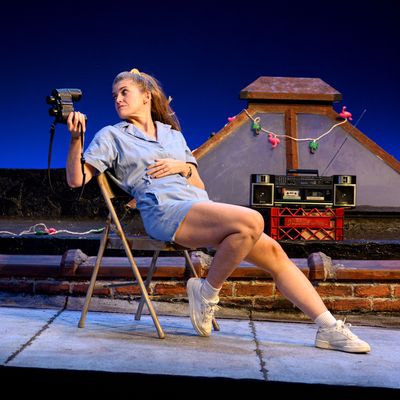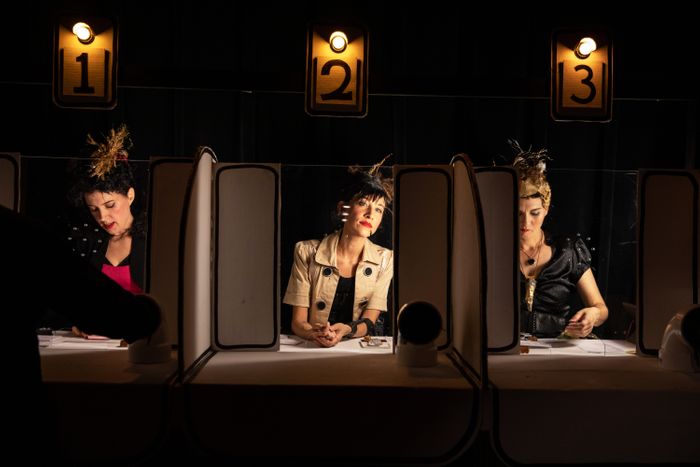
The names of the women in Liza BirkenmeierÔÇÖs Dr. RideÔÇÖs American Beach House will automatically make you cast your mind back 30 years. Not just the Dr. Ride in the title ÔÇö the physicist Sally Ride who was the first American woman in space in 1983 ÔÇö but the quartet of fictional Missouri ladies who do-si-do around each other and a summer rooftop in St. Louis. Primarily thereÔÇÖs Harriet (Kristen Sieh) and Matilda (Erin Markey), best friends who at first seem interchangeable in their mauve waitress uniforms. Their old-fashioned names will remind you of the plucky heroines from books you read when you had scraped knees and bugbites ÔÇö girls who were spies, rebels, avengers, and role models. ÔÇ£We donÔÇÖt talk about men on the roof,ÔÇØ says Harriet at one point, extremely inaccurately (she has recently finished a shaggy-dog story about a shaggy dude). But everything about the setting ÔÇö high above an unseen street below ÔÇö and the womenÔÇÖs joshing, unguarded voices makes it seem like weÔÇÖre peeping into a No Boys Allowed treehouse.
Harriet and Matilda are, though, adults, having come as a matched set through Catholic-school upbringing and twin (unused) graduate degrees in poetry. TheyÔÇÖre often entwined with each other, talking close, and itÔÇÖs unclear which one is dominant: Is it charismatic loudmouth Matilda or Harriet of the hidden depths? Both refer to male partners, a Luke and an Arthur, who barely figure; Matilda even has a daughter who has diarrhea like ÔÇ£a leaking Hot Pocket,ÔÇØ she announces while squirming out a window and onto the tar-paper roof. But sick kid or no, Matilda wouldnÔÇÖt miss an installment of the Two Serious Ladies Book Club, her social hour with Harriet, when they can sing ÔÇ£A Groovy Kind of LoveÔÇØ and drink beer and eat Breyers out of the tub. Since itÔÇÖs the night before RideÔÇÖs blastoff, we often hear the male news announcers through a crackly radio, talking about the countdown. Occasionally HarrietÔÇÖs landlady, Norma (Susan Blommaert), pops onto the roof with concerns about a dripping air conditioner, and eventually Meg (Marga Gomez) arrives, a new book-club recruit. But theyÔÇÖre satellites to Harriet and Matilda, Matilda and Harriet.
Your queerness Geiger counter should be shorting out by now. Two Serious Ladies is a sapphic classic by Jane Bowles about shucking convention and living as you wish; Sally Ride herself lived privately, coming out of the closet only in her obituary. ÔÇ£SheÔÇÖs a lesbian,ÔÇØ announces Meg confidently, recognizing a sister, though the others still believe what theyÔÇÖve read in Time magazine. Meg is the one who actually asks about the Harriet and MatildaÔÇÖs relationship, who nudges them about sex, who can see that the women are thrashing emotionally together like fish in a net. God knows MarkeyÔÇÖs raspy drawl could generate heat with a standing lamp, and Sieh has a way of seeming very rigid while also swaying, barely, towards the person speaking.
Birkenmeier and the director, Katie Brook, have built the show as a slow burn ÔÇö the sun dies in the blue-painted sky (Kimie Nishikawa designed the set), and a trick of Ben WilliamsÔÇÖs sound and Oona CurleyÔÇÖs light make the place seem hot and sticky and exactly midwestern. The women do start to melt into each other, but itÔÇÖs not some straightforward romance: Birkenmeier and Brook are interested in all the nuances of liking and knowing and needing. ThereÔÇÖs the ebb and flow of realistic talk, a bit of light binocular voyeurism, and Harriet relays some stories from her recent trip to Florida. The stories kind of wander into each other ÔÇö Harriet often fades off at the end of sentence ÔÇö but the parable is clear: SheÔÇÖs learned at last to ask for what she wants. Then, after 80 luscious minutes of conversation, the company somehow has material for a whole nother play, a ten-minute scorcher between Sally Ride (Sieh) and an old friend Molly (Markey). NASAÔÇÖs phallic rocket waiting on its launchpad is forgotten; the women stare into each otherÔÇÖs eyes. The play itself just keeps soaring up and up and up.
IÔÇÖm still working out whatÔÇÖs happening in Dr. Ride, because despite its casual humor and dizzying erotic atmosphere, thereÔÇÖs something clean-lined and literary under it. EverythingÔÇÖs been so carefully considered that it plays out like a formal court dance: each gesture mirrored, every movement countered by a partner. Even the way the women talk about poetry calls your attention to how landlady Norma talks in syncopated rhythms, pausing as if her thoughts contained the long dashes and caesuras out of Dickinson. In fact, Markey, Blommaert, and Gomez all speak with a kind of metered, emphatic artificiality ÔÇö theyÔÇÖre real and funny, but theyÔÇÖre deliberately letting us hear their line breaks as line breaks. Sieh, on the other hand, seems to be having all these thoughts for the first time. IÔÇÖve been watching Kristen Sieh for more than a dozen years, and I keep thinking she canÔÇÖt surprise me again. I already know walking in that sheÔÇÖs great. But then sheÔÇÖll go and be the best Viola in Twelfth Night that IÔÇÖve ever seen, or sheÔÇÖll slay me playing Teddy Roosevelt in a big old mustache. Here sheÔÇÖs at her most pure and radiant, a narrow, determined candle flame. I think I must have looked too long at her face in the blue light of the final scene, because itÔÇÖs been stamped on my retina like it was burned there.
If your theater appetite hasnÔÇÖt been slaked by 90 minutes of beers and Breyers with Dr. Ride, then IÔÇÖd recommend the Radiohole show Now Serving, back at Collapsible Hole in the West Village. I saw this short production in January, when it was swamped by the several experimental theater festivals that fight it out in the first weeks of the year, but now thereÔÇÖs nothing of comparative weirdness to steal its thunder. Radiohole, to be honest, doesnÔÇÖt have a lot of competition in its genre: elegantly repulsive gorgeosity, something only avant-garde art vampires could come up with.
In Now Serving, a perverted banquet with live violin accompaniment, the Radiohole gang invites the audience (or part of it) to dine with them. ThereÔÇÖs an elaborate intake situation, in which three women in severe 1940s hats greet the theatergoers at teller windows. Eventually, weÔÇÖre ushered to our seats or to the table, a Twin Peaks orgy of black and red, where participants decant wine from IV bags and nod politely as the ladies (Amanda Bender, Maggie Hoffman, and Erin Douglass) talk Dadaistically about the frustrations of the patriarchy. ThereÔÇÖs a man in a Pepe the Frog costume (Eric Dyer) who is kind of a servant? Or a sex toy? Or a sacrifice? Or a meatloaf? I remember some upsetting stuff around arugula, and Kristin Worrall ÔÇö go-to chef for downtown experimenters ÔÇö presents desserts that are meant to taste like mascarpone and clitoris. The dialogue frequently lurches into body horror: ÔÇ£Nobody else in the world knows how to kill the long pigÔÇØ is the sort of line that keeps you up at night. (ÔÇ£Long pigÔÇØ is supposedly what Pacific Islanders called human flesh.) And why do they keep describing the food as consensual?
I admit I didnÔÇÖt have the stones to sit at the table in January, but IÔÇÖve worked up my courage and IÔÇÖd do it now. ItÔÇÖs a chance to be absorbed into a Peter Greenaway film, into a Terry Gilliam landscape, into the weird fantasies of dreamers from David LynchÔÇÖs Black Lodge. If youÔÇÖre a Radiohole virgin, this would be the right show to take your first steps with, since itÔÇÖs swift and service-oriented and willing to feed you. The danger is, the tasteÔÇÖs addictive. IÔÇÖm hoping to go back, and I donÔÇÖt usually see things twice. So how do you kill the long pig? ShouldnÔÇÖt I face the arugula and find out?
Dr. RideÔÇÖs American Beach House is at Ars Nova at Greenwich House through November 23.
Now Serving is at the Collapsible Hole through November 16.



